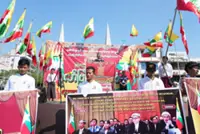BUKIT MERTAJAM: For residents of the Terubok flats here, the presence of the Rohingya among them can be rather unsettling at times.
“Sometimes, they act as if they are the citizens here and we are the outsiders instead, ” lamented resident association president Mohamed Ibrahim Syed Ibrahim.
Already a subscriber? Log in
The Star Festive Promo: Get 35% OFF Digital Access
Cancel anytime. Ad-free. Unlimited access with perks.
Related stories:
Follow us on our official WhatsApp channel for breaking news alerts and key updates!
Rohingya
,
Thank you for your report!





